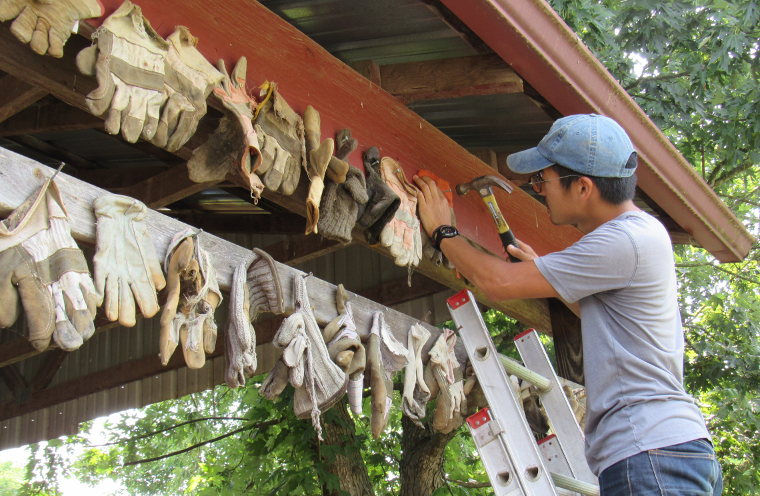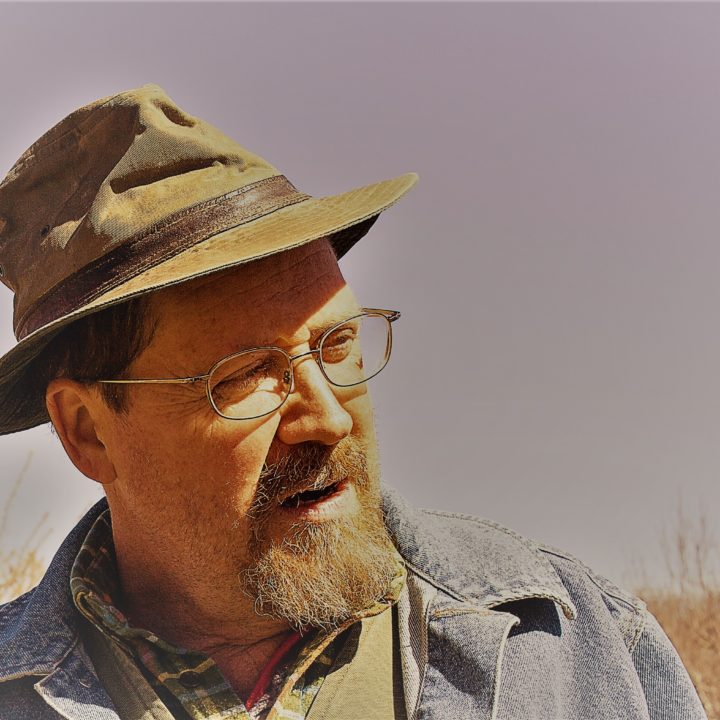
Our farm volunteer “retiring” a glove.
Truly, this isn’t much on which to build an optimistic view of the current rural-urban divide. Yet as I mentioned in my piece A Great Divide, the hard work of dialog will be left to us — town and country, middle America and the coasts — to create anew a language of respect and understanding. That said, my underlying pessimism about the willingness of the urban and the coastal elites to treat the rural population of this country with anything but disdain and contempt continues to hold.
And yet … here are a couple of hopeful stories about bridging that divide.
He was newly graduated from a respected medical school in the North with a few weeks on his hands before an East Coast residency (a residency, I might add, at an Ivy League school–associated hospital). To fill the gap, he volunteered to work on the farm for a couple of weeks. He had been born in Japan but moved with his parents to the U.S. as an infant. Rural Tennessee is primarily white and black (and mostly white). A young man of Japanese heritage hanging out in the wilds of East Tennessee is worth remarking on as an unusual occurrence. And, that he played a mean fiddle and mandolin allowed him to fit right in.
The volunteer helped us get the summer gardens established. He shoveled manure, pitched in with the hay harvest. Each evening we enjoyed a meal together, most of whose ingredients came from just beyond the back door. One night he took up his fiddle and joined some area farmer-musicians in a bluegrass jam, where they all talked about cutting hay. The last few days he was here, his girlfriend — she was of Iraqi-Jewish heritage — joined him. On the final night, after a hard day’s work, they fixed us a memorable meal of lamb tagine, again using mostly farm-raised ingredients.
The most interesting thing about our highly educated and urbane guest was this. When asked why he wanted to come and labor on a farm, particularly one in the South, he said that he had never spent time with people in rural America. He was a citizen of the vibrant cities that still dot our landscape, had traveled the world, yet knew nothing of his own backyard. Before beginning his residency he wanted to spend time in a place that was outside his comfort zone.
How unusual is the decision, for any of us, to make the effort to meet people who are different from us? And I’m not speaking of going on an ecotourism holiday, making a charity mission trip, or eating a new ethnic cuisine each night. This volunteer chose rural America specifically, for a reason that mattered: to bridge, one by one, a cultural divide with his fellow citizens.
Last Saturday we were hard at the usual farm work, trying our best to keep up with the endless deluge of tasks. I was moving one of the flocks of sheep into another pasture and Cindy was bushhogging when a large, expensive SUV nosed cautiously up our long drive. Then just as cautiously backed all the way down. We continued with our tasks.
A few minutes later the SUV reappeared, this time coming to a stop next to the barn. A well-dressed man opened his door partially and, in accented English, asked if we had any frozen chickens to sell. He had seen the farm sign at the base of our driveway listing pork, eggs, chicken, and honey for sale. He very much wanted to get out of his car, but was too afraid of our dogs. Eventually, with our encouragement, he completely opened the door and got out.
He said he worked for his government, the United Arab Emirates, and was based in Atlanta. His family, still in the car, was visiting for two weeks. His five children and wife were in the U.S. for the first time, and, like our volunteer, this man wanted them to experience an America they wouldn’t see on TV or in the movies (at least not accurately portrayed). We put the dogs up and out trundled the family, the wife and oldest daughter covered by hijabs. We showed them our modest farm — the sheep, hogs, gardens, chickens, ducks, turkeys, and orchards. They took endless videos, which by now have probably gone viral somewhere in the Middle East, and that was it. We were out of chicken, but we gave them some freshly plucked tomatoes and they went on their way.
We were very touched by the father’s actions. He really wanted to connect his family to a different experience than they would get by staying in Atlanta. (And, if you have visited our farm, you know we are not exactly easy to find.)
So that is the end of the tales. There is nothing more to them than this: two minor encounters, two different people, both doing their best to try and understand that which is not necessarily part of their culture — both working to build a small, hopeful bridge between what divides us. It’s a lesson we can all learn and emulate.






